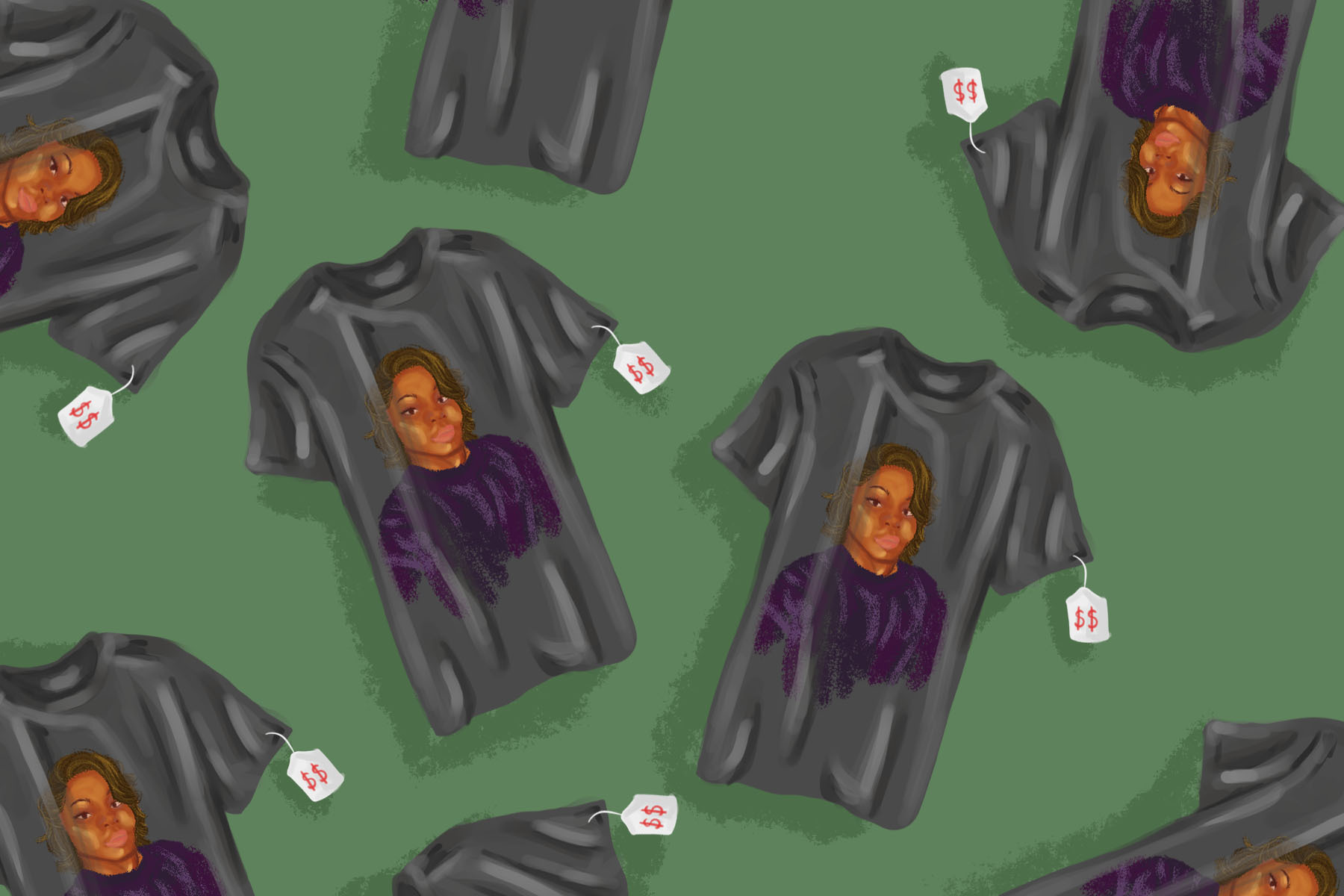When advocacy and consumerism collide, the results are often disastrous. Take, for example, the infamous “Live For Now” ad that used protest imagery as a backdrop for Pepsi products, or the equally laughable KFC Trinidad “Happy Emancipation Day” post, which formed a Black power fist out of a chicken drumstick. Can business and activism blend together, or are they ethically incompatible? Enter the controversy surrounding “Wear Their Names,” a jewelry line originally created to spread awareness and fundraise for the Black Lives Matter movement. Despite coming from good intentions, it faced strong backlash for referencing victims of police brutality in the form of merchandise, featuring items named “The Trayvon” or “The Breonna.” Commodification, it seems, is an inevitable component of projects like “Wear Their Names,” and something that’s deeply harmful to the causes they claim to support.
Based on the popular phrase “say their names,” often chanted or displayed at Black Lives Matter protests, the “Wear Their Names” jewelry line was developed by the now-defunct Shan Shui Studio with the purpose of encouraging discussion about police brutality and racism. A Post and Courier article from early September details how Shan Shui’s two lead artists devised the concept after watching footage of Charleston’s King Street riots: “They formed the idea to spin what was perceived as a violent, negative act into something good.” They wanted to “‘make something beautiful out of the rubble.’”
The following day, the two gathered broken glass from the site of the riots. These shards eventually became the core of all eight jewelry designs within the “Wear Their Names” line, with each design named after a different Black victim of police brutality — hence the title. According to The Guardian, Shan Shui’s aforementioned “Breonna” (Taylor) necklace sold for $240 while a “Trayvon” (Martin) earring set was listed at $45. All proceeds from Shan Shui’s sales would go toward From Privilege to Progress, an organization that focuses on the public discussion of race and anti-racism.
The well-publicized objections to “Wear Their Names” must have come as a surprise to Shan Shui, especially after incorporating their jewelry line into The Gibbes Museum of Art. While the studio emphasized the importance of donating its proceeds to a relevant cause and consulting artists on how to “amplify Black voices and foster positive change,” Shan Shui failed to recognize how it was commodifying those same Black voices — as well as the larger Black Lives Matter movement — simply by attributing them to accessories in the first place.
While the general public has panned “Wear Their Names” to the point where the project has been abandoned outright, the question of specifically how Shan Shui trivialized current social issues has more answers than one would initially expect. These missteps highlight the larger incompatibility of merchandising and genuine advocacy.
1. Putting a Price on Human Life
“Is it just me, or is naming each accessory after victims of police brutality & then pricing them differently giving…..slave auction-ey vibes?” read one tweet about “Wear Their Names,” having accrued over 86,000 likes. For many people who know about Shan Shui today, tweets like these were the outright damning gateway into learning about “Wear Their Names.” It shouldn’t be a surprise to learn that the jewelry line was pulled from The Gibbes Museum Store less than a day later.
Also is it just me, or is naming each accessory after victims of police brutality & then pricing them differently giving…..slave auction-ey vibes??? It’s as if the name attached to the product determines the monetary value of each life. That’s what I’m getting, it’s disturbing.
— soph 🌈 (@sophielovexhoe) September 8, 2020
There’s already hypocrisy in wishing to, as Shan Shui notes in its official apology message, “honor the victim’s names and retell their story” through fashion accessories that are related to victims in — quite literally — name only. Adding a price tag on top of this only pushes “Wear Their Names” toward a hierarchical, consumerist image and away from the humanity Shan Shui wishes to preserve through its jewelry line.
2. Not All Donations are Equal
Some may be quick to defend “Wear Their Names” by bringing up how 100% of its proceeds are donated to relevant services. While donating is certainly better than not donating, it cannot negate the harmful implications of the products themselves. Someone could sell incredibly offensive content and donate the proceeds to charity — that doesn’t mean the content is any less damaging.
Others are concerned with Shan Shui’s donation strategy because, despite using the names of people who have been killed, none of the proceeds are going directly to their families. Not only does this concern establish the nuances of charity and emphasize the need to prioritize causes that need donations the most, it also questions the legality of explicitly referencing people like Breonna Taylor or Tamir Rice in paid products.
3. The Validity of “Conversation Starters”
Another segment of Shan Shui’s apology post briefly mentions a “sense of duty” to bring awareness to the Black Lives Matter movement through “Wear Their Names.” While it isn’t difficult to see how Shan Shui may have envisioned discussions cropping up because of their products, one has to take into account how often the average person holds a detailed conversation about jewelry. That’s on top of the fact that “Wear Their Names” items don’t explicitly reference or showcase imagery from or relating to the Black Lives Matter movement. Of course, the ultimate issue with “bringing awareness” as a main justification for the controversial jewelry line is simply that “awareness” can’t accurately be measured.
Of course, “Wear Their Names” did bring about awareness in an unintended way: Thousands of people now have a better understanding of the moral complications that arise when activism is filtered through the lens of consumerism and entrepreneurship. Granted, part of what makes “Wear Their Names” and Shan Shui so interesting to scrutinize is that it does seem to be coming from a genuine attempt at doing something impactful. If Shan Shui were simply selling George Floyd shirts and taking all the profits, it would be an open and shut case: just an example of an outright irredeemable company.
The real question surrounding “Wear Their Names” is if it has the capacity to course-correct, and if we as consumers should allow or support such an effort. Ultimately, there will always be deplorable attempts at capitalizing off tragedy, just as there will be horribly misinformed attempts at charity and fruitful attempts at making a social impact. As consumers, we all have a responsibility to question the organizations and businesses that we use on a regular basis. They need our dollar at the end of the day.

















